
62% of Restaurants at Risk of Missing PCI DSS Compliance Deadline
As the March 31 deadline for Payment Card Industry Data Security Standard (PCI DSS) v4.0.1 compliance approaches, restaurants that handle card payments find themselves in a precarious situation. Recent research indicates that 62% of these businesses have not implemented DMARC (Domain-based Message Authentication, Reporting, and Conformance), a crucial email security measure required to protect against phishing attacks.
The Importance of PCI DSS Compliance
Established in 2004, PCI DSS acts as a foundational framework for securing card transactions. Its latest version, v4.0.1, introduces enhanced anti-phishing protocols to safeguard sensitive customer data. The urgency for compliance intensifies as research shows a significant surge in phishing scams targeting businesses in the hospitality sector, with reports suggesting that 64% of restaurants are experiencing increased threats.
Gaps in Awareness and Action
Shockingly, many restaurant owners believe they are ahead of the game, with 72% confident about their compliance status. However, only 38% have actually taken the steps to implement the required DMARC safeguards. A notable factor contributing to this misleading confidence is the lack of understanding regarding the responsibility of securing payment communications. Nearly 63% of stakeholders admit unfamiliarity with the new requirements, while 49% wrongly believe that ensuring compliance is solely the duty of their payment processors.
Proactive Measures Needed
Experts, including Gerasim Hovhannisyan, the CEO of EasyDMARC, assert that with payment data at risk, restaurants must prioritize email security now rather than waiting until after an attack or approaching deadline. By addressing this compliance gap, business owners not only protect sensitive customer data but also strengthen their overall cybersecurity posture.
Restaurants must act decisively to align with PCI DSS v4.0.1 requirements and implement DMARC measures. Ignoring these mandates can lead to significant penalties and compromised customer trust.
 Add Row
Add Row  Add
Add 

 Add Row
Add Row  Add Element
Add Element 




Write A Comment